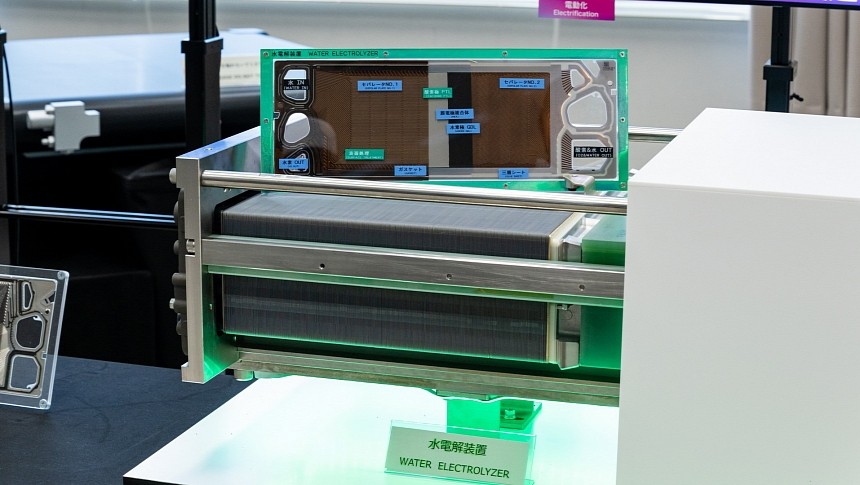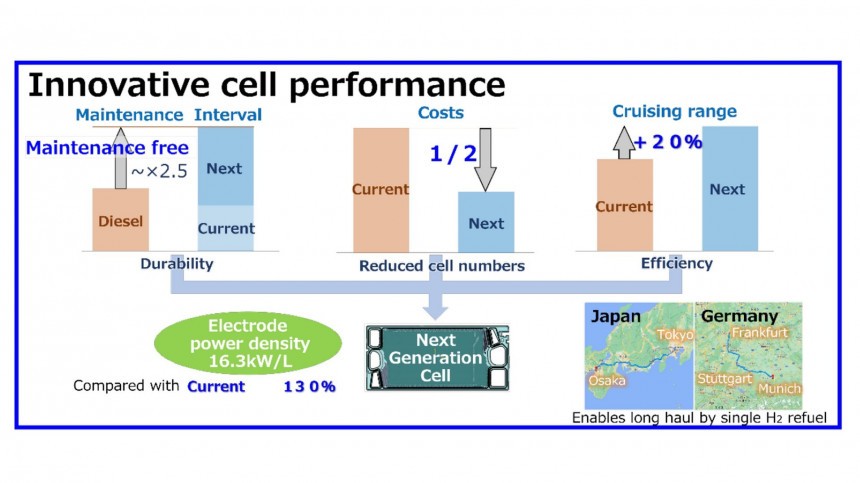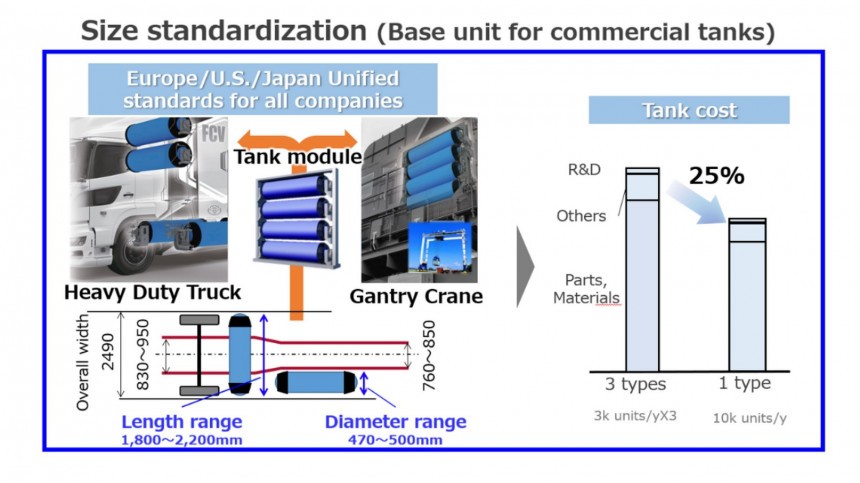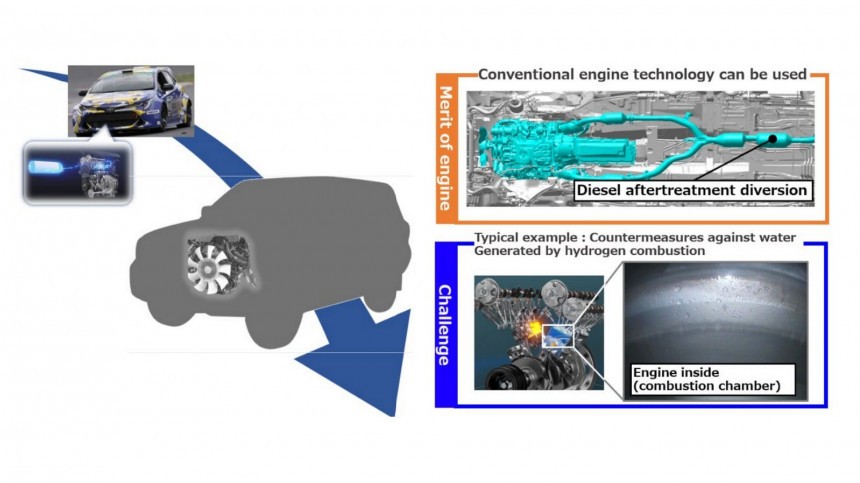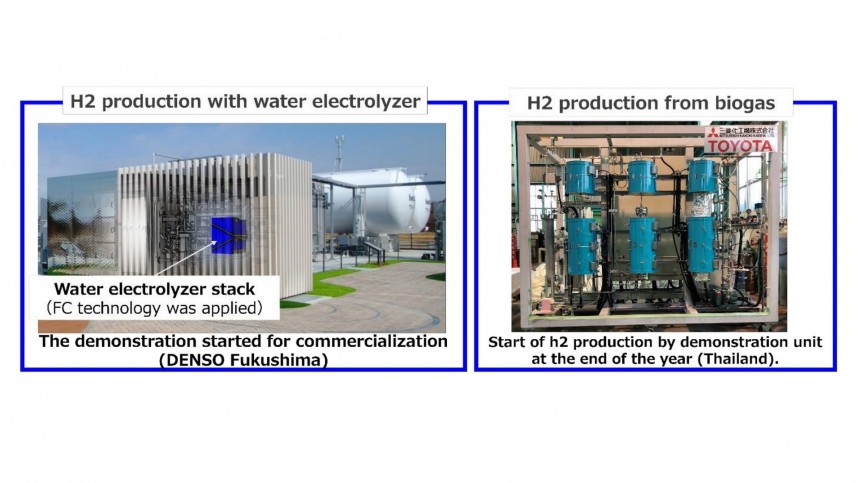When I wrote about Toyota's plans to sell battery electric cars (BEVs), I forgot to mention that those plans were announced by a new business division called BEV Factory. Toyota disclosed another division on the "Let's Change the Future of Cars" workshop: the Hydrogen Factory. As you may imagine, it focuses on fuel cells and the ridiculous pursuit of combustion engines powered by that gas. For the serious part of the idea, the Japanese company counts on a new fuel cell and commercial vehicles.
The new fuel cell should reach the market in 2026. It has three main targets: having a 50% cost reduction per stack, offering 20% more cruising range, and providing easier maintenance than a diesel vehicle. Toyota did not disclose costs or what it means by easier to fix, but it shared a graphic that shows the maintenance intervals for diesel and fuel cell electric vehicles (FCEV). Current ones demand service earlier than diesel vehicles, but Toyota's next-generation FCEVs will only require maintenance in an interval a bit more than twice that of diesel competitors. The Japanese carmaker forgot to mention prices, which are crucial for the vehicles it believes will push hydrogen and fuel cells forward.
When it mentions each stack will cost half the price of current ones, Toyota does not give us any idea how that compares to diesel engine expenses on maintenance. And that does not even start to address how many more details we need. What are the wear parts in a fuel cell, only the stacks? What about the electric motors that power FCEVs? How much more do they last than diesel engines? What is the cost per mile or kilometer that these FCEVs will have? Again, quite a lot of missing data for us to have a good idea of how Toyota's future FCEVs will compare to diesel trucks.
The deal is that making commercial vehicles carbon-neutral is mandatory: the law will not give automakers any option very soon. Fuel cells are a way to get there, especially when batteries are not a feasible option for commercial vehicles apart from last-mile deliveries. Yes, we have trucks powered by batteries, but they are heavier than their combustion-engined competitors, which prevents them from carrying more cargo. The severe conditions in which they have to work and charge will kill their battery packs sooner than if they could charge slowly. That will make it even more evident that battery packs are expensive wear parts. The cost to replace these massive components will demonstrate battery electric trucks are a bad idea. Hydrogen and fuel cells seem to be the best solution for decarbonizing road cargo transportation.
Apart from the new fuel cells, Toyota also wants to lower costs by creating a world standard for hydrogen tanks. The Japanese carmaker estimates that such a standard would bring prices down by 25%. Toyota is also working on a tank to store liquid hydrogen, which shows that storage is still a massive issue for dealing with this gas. That is probably why Toyota included carbon-neutral fuels under the responsibility of its Hydrogen Factory.
Although the company did not mention that in its presentation, renewable and synthetic fuels are probably the best way to store hydrogen. A reformer could generate the hydrogen fuel cells need. The resulting carbon dioxide would not be a problem because it was already in the atmosphere, but it could be trapped and reused if that was a concern. Either this is not economically feasible, or Toyota does not want to warn competitors of its efforts in that regard. Roland Gumpert Automobile is openly pursuing that solution.
Toyota's official plan for synthetic and renewable fuels is to burn them in internal combustion engines (ICEs). As long as they are carbon neutral, that would make them perfectly fine. What the Japanese company forgets is that ICEs are inherently inefficient and pollutant. Even if the carbon they release is already in the atmosphere – which prevents a worsening of the greenhouse effect – we will still see nitrogen oxides, carbon monoxide, particulates, ozone, and other elements that are harmful to human health.
Burning hydrogen also generates these pollutants. With the low efficiency of ICEs and the high price of this gas, it is also a waste of precious resources. If the idea is to keep combustion engines alive, synthetic and renewable fuels make more sense. Toyota is also betting on them, especially on second-generation bioethanol, which is made from biomass. In other words, all vegetable waste available, such as fallen leaves, grass, etc. Nowadays, it is more expensive than ethanol made from sugarcane due to the enzymes that are used to break cellulose into sugars.
Toyota is also working to produce the hydrogen its commercial FCEVs will need, almost in the same way as Nikola has committed to do. The Japanese carmaker will use its fuel cell technology in reverse. Instead of joining hydrogen and oxygen to generate water and electricity, it will use electricity to separate hydrogen from water, releasing oxygen in the process. Yes, that's electrolysis, but Toyota claims to have used fuel cell stacks for that.
The other branch of hydrogen production is biogas from chicken manure and food waste in Thailand. The Japanese carmaker has made a partnership with Mitsubishi Kakoki Corporation to develop this method.
These measures make Toyota believe it can have a nice slice of the hydrogen market in its main markets by 2030: China, Europe, and North America. Apart from vehicles, the world's largest automaker will also sell fuel cells to other companies. Although that is important, creating a hydrogen network is crucial for any carmaker willing to invest in fuel cell technology. Will the Hydrogen Factory help fabricate one? I'll follow it closely to see what it manages to attain.
When it mentions each stack will cost half the price of current ones, Toyota does not give us any idea how that compares to diesel engine expenses on maintenance. And that does not even start to address how many more details we need. What are the wear parts in a fuel cell, only the stacks? What about the electric motors that power FCEVs? How much more do they last than diesel engines? What is the cost per mile or kilometer that these FCEVs will have? Again, quite a lot of missing data for us to have a good idea of how Toyota's future FCEVs will compare to diesel trucks.
Apart from the new fuel cells, Toyota also wants to lower costs by creating a world standard for hydrogen tanks. The Japanese carmaker estimates that such a standard would bring prices down by 25%. Toyota is also working on a tank to store liquid hydrogen, which shows that storage is still a massive issue for dealing with this gas. That is probably why Toyota included carbon-neutral fuels under the responsibility of its Hydrogen Factory.
Toyota's official plan for synthetic and renewable fuels is to burn them in internal combustion engines (ICEs). As long as they are carbon neutral, that would make them perfectly fine. What the Japanese company forgets is that ICEs are inherently inefficient and pollutant. Even if the carbon they release is already in the atmosphere – which prevents a worsening of the greenhouse effect – we will still see nitrogen oxides, carbon monoxide, particulates, ozone, and other elements that are harmful to human health.
Toyota is also working to produce the hydrogen its commercial FCEVs will need, almost in the same way as Nikola has committed to do. The Japanese carmaker will use its fuel cell technology in reverse. Instead of joining hydrogen and oxygen to generate water and electricity, it will use electricity to separate hydrogen from water, releasing oxygen in the process. Yes, that's electrolysis, but Toyota claims to have used fuel cell stacks for that.
These measures make Toyota believe it can have a nice slice of the hydrogen market in its main markets by 2030: China, Europe, and North America. Apart from vehicles, the world's largest automaker will also sell fuel cells to other companies. Although that is important, creating a hydrogen network is crucial for any carmaker willing to invest in fuel cell technology. Will the Hydrogen Factory help fabricate one? I'll follow it closely to see what it manages to attain.
